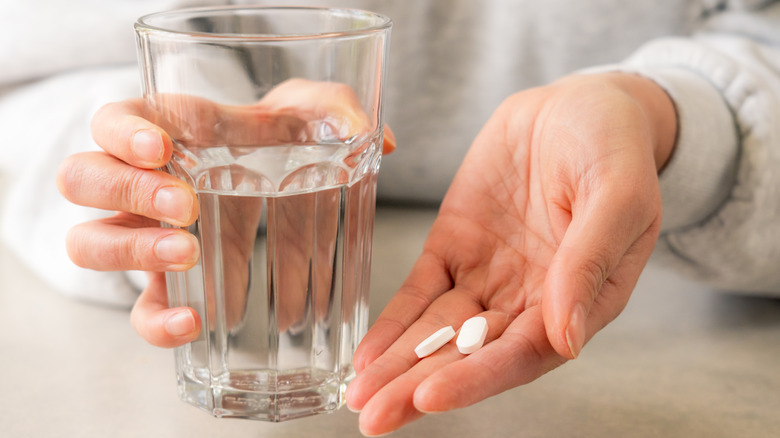Is This Popular Beverage An Effective Alternative To Ibuprofen? Here's What We Know
If you're looking for a natural alternative to more traditional pain-relief medications, there's one beverage you're likely drinking each morning that may help ease your aches and pains — that is, if you're among the approximately 73% of Americans who have a daily coffee habit (via Drive Research).
As a non-steroidal anti-inflammatory drug (NSAID), ibuprofen treats mild to moderate pain by blocking prostaglandin production, as outlined in a 2010 research article published in the Oman Medical Journal. Functioning much like hormones, prostaglandins influence inflammation, fever, and pain. Although considered safe for over-the-counter (OTC) use, common side effects associated with ibuprofen include nausea, vomiting, and gastrointestinal distress. However, long-term use of the medication or taking more than directed may lead to more serious side effects, like stomach or intestinal bleeding. It's been reported that approximately 1 in every 5 people who use NSAIDs on a long-term basis will suffer damage to their gastrointestinal tract. If you're looking to reduce these health risks, but are still in need of effective pain relief, science tells us you may want to try reaching for a cup of joe.
The connection between caffeine and pain relief
The psychoactive compound in coffee that gives us that desired burst of energy and focus is caffeine. Caffeine operates by blocking our adenosine receptors, which are instrumental in the neural communication of pain between the brain and our sensory neurons, according to a 2022 scientific review published in Cureus. By barricading these receptors, people who drink coffee may experience a reduction in pain.
In one 2017 animal study referenced in the review, researchers looked at whether the administration of caffeine influenced levels of postoperative pain in sleep-deprived rats. It was found that caffeine hindered postoperative pain sensitivity that would otherwise be heightened due to a lack of sleep. This sounds encouraging for those of us who enjoy a morning espresso, but some research suggests that a combination treatment of caffeine and ibuprofen might prove most effective compared to caffeine or ibuprofen alone. Such was the case in an alternate 2006 animal study published in the European Journal of Pharmacology in which combined doses of caffeine and ibuprofen yielded the greatest pain-blocking effects in mice with arthritis compared to the use of morphine, caffeine, or ibuprofen on their own.
The effects of combining caffeine and ibuprofen
It's not just rodent studies that have arrived at these conclusions. In an updated 2014 scientific review published in the Cochrane Database of Systematic Reviews, researchers found evidence to suggest that supplementing analgesic medications (such as ibuprofen) with anywhere between 100 and 130 milligrams of caffeine may produce minor, yet notable, improvements in patient pain.
While drinking coffee may be one natural method to turn to over ibuprofen, some people alternatively opt for acupuncture treatment for pain relief. Interestingly, however, findings of a 2017 mouse study published in Scientific Reports showed that drinking coffee may cancel out the pain-relief effects of acupuncture. The researchers attributed this outcome to the fact that acupuncture has been linked with the activation of specific pain-relieving adenosine receptors, while caffeine blocks these actions. In light of these findings, using just one ibuprofen alternative may be better than two.
While many people are incorporating more holistic, natural health practices into their lives, it's important to be mindful of the dose. Board-certified bariatric physician Dr. Kevin Huffman told SingleCare that more research is needed into the potential side effects of combining caffeine with ibuprofen. Therefore, we want to keep NSAID doses low and stick to short-term use of the medication.



